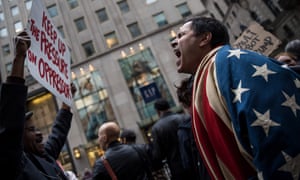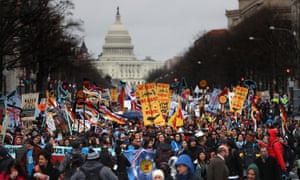ANTI-PROTEST BILLS WOULD ‘ATTACK RIGHT TO SPEAK OUT’ UNDER DONALD TRUMP

More than 20 states have proposed bills that would crack down on protests and demonstrations since Donald Trump was elected, in a moved that UN experts have branded “incompatible with US obligations under international human rights law”.
The proposed laws would variously increase the penalties for protesting in large groups, ban protesters from wearing masks during demonstrations and, in some states, protect drivers from liability if they strike someone taking part in a protest.
The American Civil Liberties Union (ACLU) said more than 30 separate anti-protest bills have been introduced since 8 November in “an unprecedented level of hostility towards protesters in the 21st century”. Their introduction comes amid a huge increase in activism and engagement, much of it inspired by Trump’s election to the presidency.
The ACLU and the National Lawyers Guild have said many of the bills are likely unconstitutional. “The proposed bills have been especially pervasive in states where protests flourished recently,” said Vera Eidelman, who works in the ACLU’s speech, privacy and technology project.
“This flood of bills represents an unprecedented level of hostility towards protesters in the 21st century. And many of these bills attack the right to speak out precisely where the supreme court has historically held it to be the most robust: in public parks, streets and sidewalks.”
The flurry of legislation has prompted UN experts to intervene, with two special rapporteurs from the UN’s Office of the High Commissioner for Human Rights – the UN body which works to promote and protect human rights – to complain to the US state department at the end of March.
In a recent letter to the government, David Kaye and Maina Kiai, from the Office of the High Commissioner for Human Rights (OHCHR), listed specific pieces of legislation which they said were “criminalizing peaceful protests”.
Kaye and Kiai, special rapporteurs on the freedom of expression and freedom of peaceful assembly respectively, said the bills represent “a worrying trend that could result in a detrimental impact on the rights to freedom of peaceful assembly and freedom of expression in the country”.
The legislation would “severely infringe upon the exercise of the rights to freedom of expression and freedom of expression and freedom of peaceful assembly,” Kaye and Kiai wrote.
Hundreds of thousands of people across the country took part in women’s marches on 21 January, and since then scores of other actions have taken place against Trump and other elected officials.
A number of proposed laws – some of which have already passed – have been introduced in North Dakota,in an apparent response to the protests against the North Dakota Access pipeline. More than 1,000 people camped in Standing Rock for months in an attempt to stop the construction of the pipeline, and there were a number of clashes with police.

In Oklahoma, house bill 1123 passed the state house and senate and was sent to the governor on 27 April. If Mary Fallin, a Republican, signs the bill, it will increase penalties for trespassing on “critical infrastructure” including oil refineries and chemical manufacturing plants. Under the new law, damaging equipment in those facilities would be punishable by a $100,000 fine and up to 10 years in prison.
In Tennessee, a bill is currently under consideration by the state senate which would give “civil immunity for the driver of an automobile who injures a protester who is blocking traffic in a public right-of-way if the driver was exercising due care”. The state’s Republican governor, Bill Haslam, signed a separate bill into law in April which increased the penalty for obstructing streets and highways in a way which restricts emergency vehicles. A similar bill is being considered in Minnesota.
The letter was particularly scathing about two bills signed into law by North Dakota’s governor, Doug Burgum, in March. House bill 1304 cracks down on people wearing masks or covering their faces at demonstrations; house bill 1426 increased protest penalties from a class C felony to a class B felony if a “riot involves 100 or more persons”, doubling the maximum prison sentence to 10 years.
For the purpose of the legislation, a riot is defined as “a public disturbance involving an assemblage of five or more persons which by tumultuous and violent conduct creates grave danger of damage or injury to property or persons or substantially obstructs law enforcement or other government function”. It would likely be applicable to non-violent direct action, which protesters engaged in during the Dakota Access pipeline protests.
Both bills were seen as reactions to protests against the Dakota Access pipeline. The UN told the US state department that HB 1426 in particular “will highly increase penalties for participating in protests and therefore is likely to have a chilling effect on protesters in North Dakota”.







Follow Us!